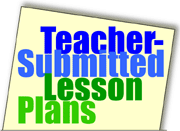|
Home >
Teacher Lesson Plans >
Archives >
Literature, Visual Arts, History, Psychology, Nutrition >
Lesson Plan
|
|
L E S S O N P L A N
|
|
Three Healthful Meals:
A Practical Food-Guide-Pyramid Activity


Subjects
Grades
Brief Description
Plan a day of healthful eating based upon serving guidelines
in the food guide pyramid.
Objectives
Students
- activate knowledge of the food guide pyramid and the basic food
groups in order to plan nutritious meals.
Keywords
Food groups, food, pyramid, health, nutrition, meal, breakfast,
lunch, dinner, supper, health, nutrients
Materials Needed
- magazines
- glue
- scissors
- markers
- three paper plates per child
- a copy of the newFood Guide Pyramid (introduced by the U.S. Department of Agriculture in 2005), one per child; Sources: this
one includes useful information; this
one is large and easy to read; or this
ready-to-color one for kids.
- computer access to clip art (optional)
Lesson Plan
Pass out copies of the food guide pyramid or have one displayed
in the classroom. (See sources in Materials
Needed section above.) Explain to students each part of
the food guide pyramid. Discuss the number of servings of each food
group that should be consumed daily in order to receive the nutrients
that are part of a healthful diet.
Provide each student with three plates. Have students write breakfast
on the back of one paper plate, lunch on the back of another,
and supper on the back of the third plate.
Explain to students that they will be planning three meals for
one day. Their meal plan for the day must reflect the following
guidelines from the food pyramid:
2 servings from the meat group
3 servings from the fruit group
3 servings from the vegetable group
4 servings from the milk and cheese group
6 servings from the bread and cereal group
You might share with students some information about the new food pyramid introduced by the U.S. Department of Agriculture in 2005.
Draw students' attention to the fact that some foods might include
ingredients from more that one food group. For example, a slice
of pepperoni pizza would include a serving from the bread group
(crust), the milk group (cheese), the meat group (pepperoni), and
the vegetable group (tomato sauce).
Distribute glue, scissors, and markers.
Students will collect a handful of food images from magazines
and glue them to the appropriate plates. Then they will return to
the magazines to find other images that could help fill up their
plates.
You might set up another table with art supplies. Students could actually draw, paint, or use colored paper to create additional items for their plates.
If your students have access to computers, they might use clip art sites that offer illustrations of food items. Following are a few good sites where students might find food art:
Clipart Guide: Food
Food Clipart
IconBazaar: Food Clipart
Food Clipart
Food Clip Art
Webweavers Free Clipart: Fruit
Free Clipart Pictures: Fruit
Vegetable Clip Art Index
Classroom Clipart: Vegetable Clipart
Food and Cooking Clip Art Index
Students might use Google Image Search to find additional images.
Allow plenty of time for the students to complete the activity
(20 to 30 minutes). At the conclusion of the project, students will
be responsible for recording the number of servings from each food
group and identifying the foods. They should include foods they
actually would eat for each meal. Collect students' plates, or have
students present their work to their classmates. Display the plates
on a classroom bulletin board.
Assessment
Check each student's finished project to see that all items are
included. Deduct five points from a grade of 100 for each missing
item. Each project should contain two servings from the meat group;
three servings from the fruit group; three servings from the vegetable
group; four servings from the milk and cheese group; and six servings
from the bread and cereal group.
Submitted By
Mandy Logue, Alcorn Central Elementary School in Glen, Mississippi
Originally published 03/20/2003
Last updated 01/18/2010



To help us keep our Lesson Plan Database
as current as possible, please e-mail
us to report any links that are not working.
|
|